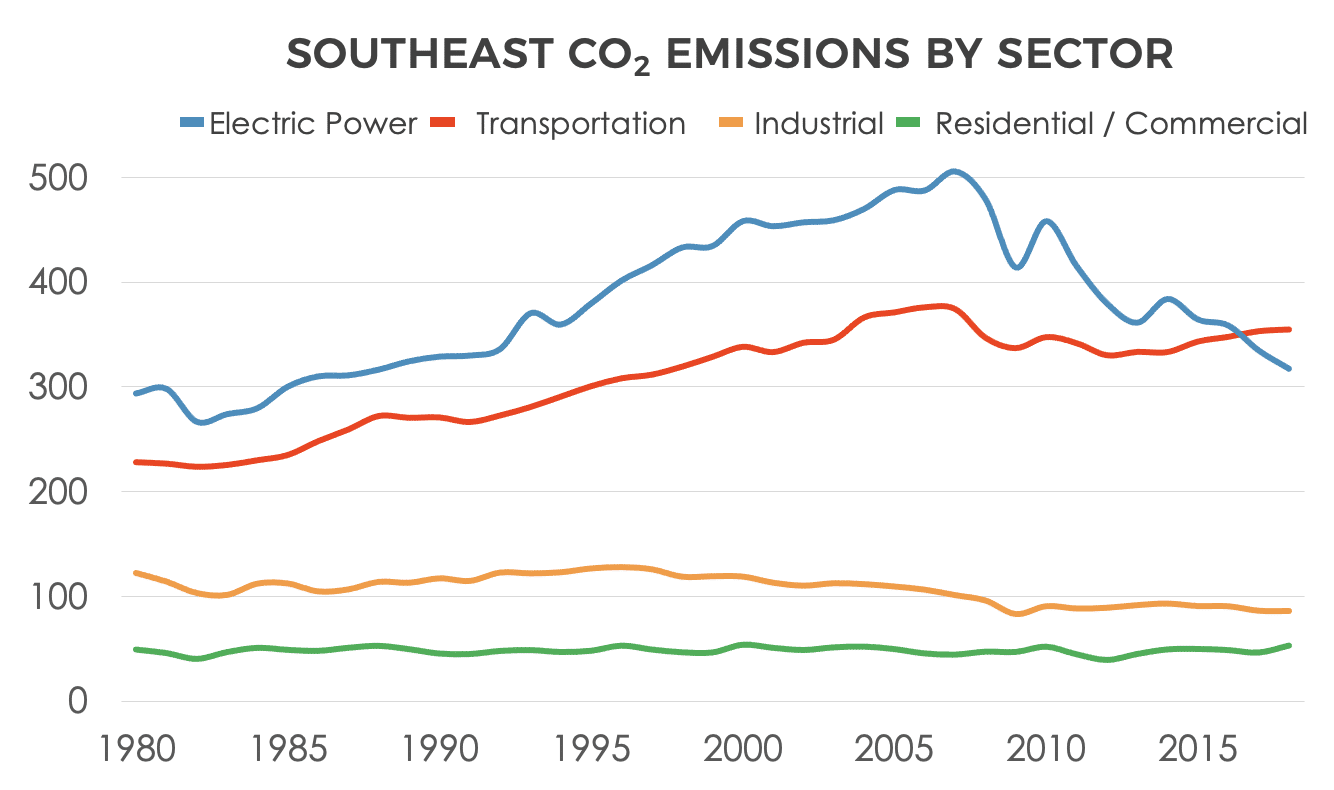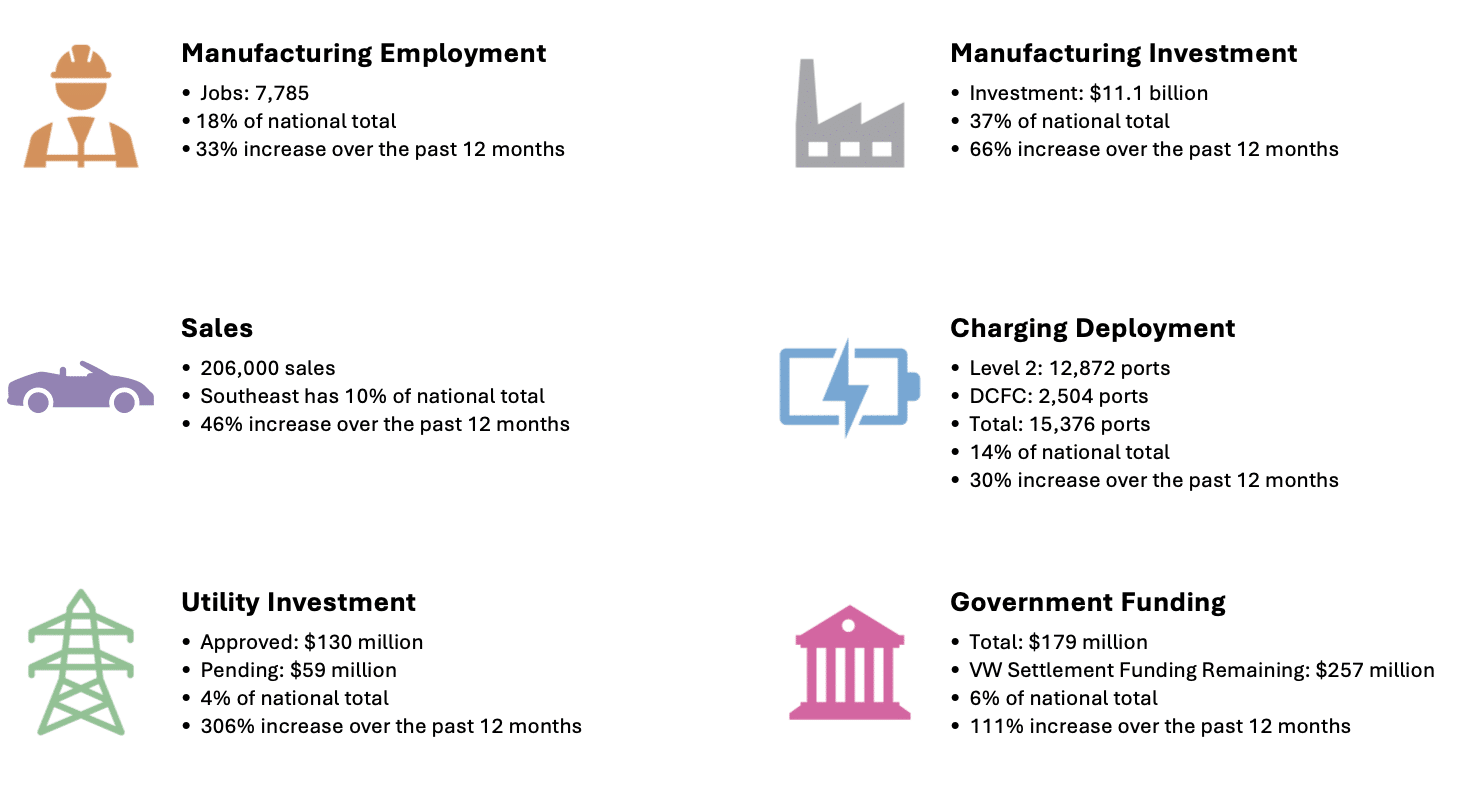A version of this blog originally appeared in Drawdown Georgia on November 17, 2021.
Georgia Could Achieve Immediate and Deep Cuts In Carbon Emissions
Carbon is the pollutant with the most significant impact on Earth’s changing climate, and the transportation sector is the largest emitter of carbon emissions in Georgia, the Southeast, and nationwide. Transportation-related carbon emissions are spewed from the tailpipes of fossil gas and diesel-burning engines, but by electrifying transportation, we can realize immediate and deep cuts in carbon emissions that can be deepened by cleaning the electricity grid and increasing alternatives to personal vehicle-centric mobility.

Electric cars, trucks, and buses don’t have tailpipes and don’t produce carbon emissions. It is true that electric vehicles (EVs) are not ‘zero-emission’ because most electricity powering EVs comes from fossil fuel power plants. But even taking into account the carbon emissions from those fossil fuel-powered plants, driving an EV in Georgia produces approximately 2.5 times fewer carbon emissions than driving a gas vehicle. Additionally, an EV purchased today will become increasingly cleaner over its lifetime as Georgia’s solar market continues to grow (the state currently ranks #9 nationally) and other carbon-free energy solutions are deployed.
According to Drawdown Georgia, the Peach state could eliminate 1 million metric tons of carbon emissions by replacing 250,000 gas passenger vehicles with EVs. And that’s just considering passenger vehicles, not to mention fleets and public transportation opportunities. There are approximately 6.6 million registered passenger vehicles in Georgia, so if we save 1 million tons of carbon per quarter million, we have a total opportunity of reducing approximately 26 million metric tons of emissions by electrifying them all. That’s equal to reducing the state’s total emissions by over 20%.
Georgia’s Poised To Be Regional Powerhouse
Electrifying transportation will transform one of the nation’s largest industries. In 2019, the transportation sector accounted for 8.7% of U.S. gross domestic product. Changes in this sector will therefore have compounded effects throughout our economy. Ford, General Motors, Honda, Hyundai, and Volkswagen have all committed to the electrification of 100% new vehicles between 2030 and 2040. These five automakers alone have committed over $800 billion to get it done. Scores of money and jobs are at stake, including in the supply chain, from mineral mining to charging station providers.
Southern Alliance for Clean Energy (SACE) and Atlas Public Policy publish the second annual “Transportation Electrification in the Southeast” report, tracking the regional EV market across a range of indicators. This year’s report shows remarkable growth across all six indicators in the Southeast.
Southeast EV Indicators through July 2021

SACE and Atlas Public Policy also produced state-specific data, including for Georgia, which shows that Georgia is a regional EV manufacturing and supply chain powerhouse, second only to Tennessee in manufacturing investment and jobs. Georgia also ranks second in our region in EV sales and charging station deployment, trailing only Florida. Strong EV sales and charger deployments point to a growing EV market, which is vital for Georgia to sustain in order to continue attracting EV manufacturing and supply chain investments as manufacturers want to locate where their products are selling.
As a measure to ensure Georgia holds its competitive advantage, Governor Kemp created the Electric Mobility Innovation Alliance. The alliance brings together industry stakeholders in order to identify what’s needed to grow the electric mobility ecosystem and strengthen Georgia’s position in electrification-related innovation and manufacturing.
State’s Economy Could Get $7.9 Billion Annual Boost
However, the economic opportunities go beyond manufacturing and jobs. Today, Georgia imports 100% of the gas and diesel that fuels transportation. SACE’s “Retained Transportation Fuel Spending in the Southeast” report shows when Georgia consumers fill up at the pump, ⅔ of every dollar spent trickles out of the state’s economy, destined for oil-rich states and nations. If all the cars, trucks, and buses in Georgia were electric today, ⅔ of the money consumers and fleet managers would spend on electricity would stay in the local economy. The result would be a $7.9 billion annual boost to the state’s economy.
And here’s the kicker – the more Georgia’s utilities invest in local renewable energy like solar and battery storage, the bigger the boost. As the electricity grid moves away from coal and fossil gas generation, EVs get increasingly cleaner. In addition, electricity generation becomes more locally sourced, which keeps more consumer dollars recirculating in Georgia.
Looking Ahead
Though the focus of this blog post is on electrifying transportation in Georgia, it’s important to note that maximum climate and economic benefits result from pairing transportation electrification with efforts to reduce the number of personal vehicles on the road. Investments such as mass transit and community walk- and bike-ability, along with increasing renewable electricity generation to reduce the utility sector’s carbon intensity, could achieve these maximum benefits. This ‘reduce, clean, electrify’ strategy engages multiple sectors in order to multiply economic development, job growth, and carbon reduction opportunities.
Climate science is clear — we must significantly reduce carbon and other greenhouse gas emissions. And all the while, states like Georgia are well-positioned to leverage these climate solutions to spur economic growth, create jobs, and save consumers and fleets a lot of money.
Electrify the South is a Southern Alliance for Clean Energy program that leverages research, advocacy, and outreach to promote renewable energy and accelerate the equitable transition to electric transportation throughout the Southeast. Visit ElectrifytheSouth.org to learn more and connect with us.



